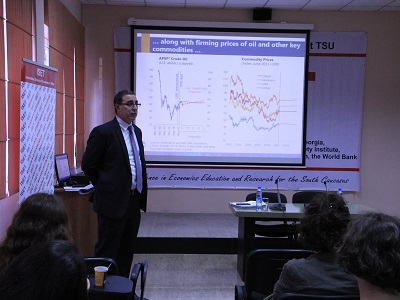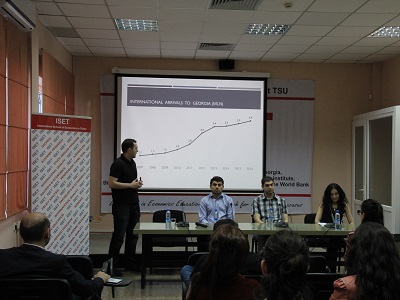ISET continues its student policy paper seminar series for the institute's second-year students. This time, Ketevan Bochorishvili, Natia Maisuradze, Nami Surguladze, Orkhan Suleymanli and Nijat Guliyev presented their joint paper on agricultural development.
The students opened by that the slow growth in agricultural sector of Georgia is a subject of ongoing debate. Their cross comparison of agricultural indicators showed that while agricultural development in Georgia predictably lags behind that of Germany and the United States, it also falls behind Armenia, Azerbaijan, Belarus, Ukraine, and the Kyrgyz Republic. While 50 percent of employment is in agriculture, agriculture accounts for just 10 percent of the country's GDP, which clearly shows the utter inefficiency of agriculture in Georgia.
On May 22, ISET hosted Francois Painchaud, the IMF Resident Representative in Georgia. Mr. Painchaud presented the 2017 May Regional Economic Outlook for the Caucasus and Central Asia, highlighting the three main areas of the global and regional environment, outlook and policy actions, and policy priorities.
At the beginning of the presentation, Mr. Painchaud overviewed the main trends in the global and regional environment. Firstly, the IMF predicts higher than expected real GDP growth in 2017, mainly at the expense of higher growth projections in the US, China, Russia, and emerging markets.
ISET second year students continued their series of policy seminars, this time focusing on the Georgian tourism sector. Shako Gobronidze, Diana Nersisyan, Robizon Razamadze, and Revaz Surguladze presented on the topic of seasonality, which both poses various challenges and grants opportunities for the Georgian tourism sector.
Seasonality affects the development of the tourism sector in several ways. By concentrating income generation within a limited timeframe, it creates a degree of uncertainty for investors, which could deter efforts to attract investments, especially for small tourism startups. Uneven demand due to seasonality also affects other businesses and sectors in the tourism supply chain, such as taxis, hotels, distribution, and agriculture. Finally, seasonality lowers the quality of service in the tourism sector, by giving fewer incentives to employers to train their staff or search for the best talent.













